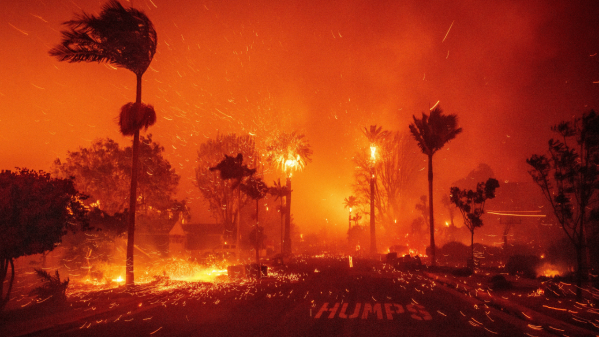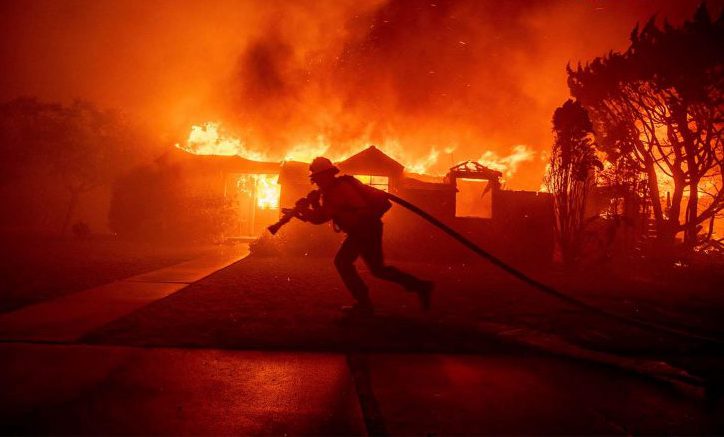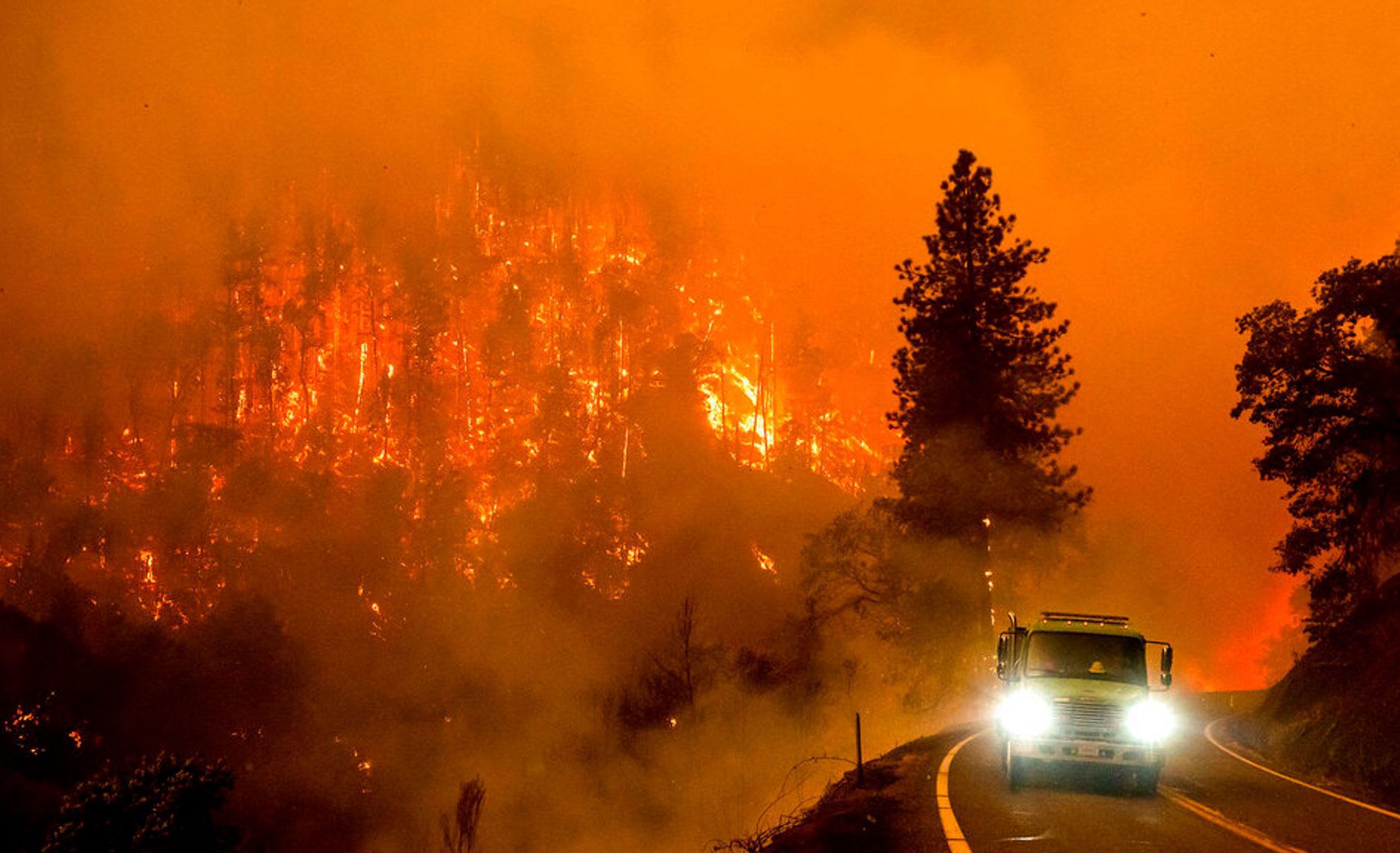California wildfires spark the question: Were fires set to trigger economic and ecological collapse?
As California battles yet another wave of catastrophic wildfires, questions are swirling about the origins and intent behind the disaster. With damage estimates skyrocketing to $150 billion and climbing, the fires are being compared to wartime devastation, raising questions about who stands to benefit from California’s downfall.

Critics point to a series of suspicious circumstances—lack of water pressure in fire hydrants, the diversion of firefighting resources, and the timing of insurance policy cancellations—as evidence of a premeditated crisis. Some even speculate that the fires were deliberately set to destabilize California’s economy, contaminate its food supply, and accelerate the state’s fiscal collapse.
Insurance Companies Flee California
The wildfire crisis comes on the heels of a mass exodus of insurance companies from California. In April 2024, State Farm announced it would not renew 72,000 property insurance policies in the state, citing the need to maintain financial solvency. Other major insurers followed suit, leaving thousands of homeowners and businesses without coverage. According to industry analysts, the decision was driven by the unsustainable cost of wildfire-related claims. But conspiracy theorists argue that insurers may have had advance knowledge of the impending disaster.
“State Farm and other insurers knew California was a ticking time bomb,” said Mike Adams, founder of Natural News. “They saw the writing on the wall and pulled out before the fires hit. The question is, did they know something the rest of us didn’t?”
A Premeditated Crisis?
The lack of water pressure in fire hydrants and the diversion of firefighting equipment to other regions have fueled suspicions that the fires were allowed to rage unchecked. Some have even suggested that the conditions for the disaster were deliberately engineered. “This wasn’t just negligence—it was a premeditated crisis,” Adams claimed. “Someone wanted maximum destruction.”
The fires have also been linked to broader geopolitical and economic agendas. With California’s economy already teetering on the brink, the disaster could push the state into fiscal collapse. According to Bloomberg News, California’s “Fair Plan”—a state-run insurance program for high-risk properties—could be on the hook for nearly $437 billion in damage payouts. If private insurers refuse to cover properties, the state’s real estate market could collapse, taking property taxes and local economies down with it.
Ecological and Food Supply Terrorism
Beyond the economic fallout, the fires have unleashed an ecological disaster. The burning of thousands of homes and buildings has released a massive cloud of dioxins—highly toxic chemicals that can cause cancer at minuscule levels. These dioxins are now spreading over California’s Central Valley, one of the nation’s most critical food production regions.
“This is an act of food supply terrorism,” Adams warned. “The dioxins will contaminate crops, soil, and livestock, potentially shutting down farms and disrupting the national food supply chain.”
Despite the risks, neither the Environmental Protection Agency (EPA) nor the California state government has conducted widespread testing for dioxin contamination. Critics argue that this inaction is deliberate, paving the way for authorities to declare farmland unsafe and further destabilize the food supply.
A Broader Agenda?
The wildfires have also reignited debates about climate change, geoengineering, and the role of technology in modern disasters. Some theorists suggest that the fires were started using advanced weaponry, such as directed energy weapons, while others point to the possibility of geoengineered weather events. “This is more than just a fire,” Adams said. “It’s a multi-pronged attack on California’s economy, ecology, and food supply.”
The disaster has also raised concerns about the future of automation and artificial intelligence. As humanoid robots and AI systems increasingly replace human workers, some fear that the fires are part of a broader plan to depopulate California and other regions. “The globalists have two choices: pay people off with universal basic income or kill them off,” Adams said. “I think they’re doing both.”
For those living in California, the wildfires serve as a stark reminder of the state’s vulnerabilities. “If you’re still in California, consider getting out,” Adams advised. “This is just the beginning. The insurance companies know something bigger is coming, and you don’t want to be there when it hits.”

LA County Fire Department donated essential firefighting equipment to Ukraine
Reports are resurfacing about how the Los Angeles County Fire Department donated essential equipment to Ukraine back in 2022 – equipment that could have been useful now as the county finds itself struggling to contain multiple blazes.
“All over Southern California, people are finding ways to keep Ukraine front and center, and it’s no different for the Los Angeles County Fire Department,” ABC 7 reported in 2022.
Today, that goodwill gesture has come under scrutiny as the department scrambles to respond to the escalating crisis.
Democratic politicians fumble reaction to disaster
Compounding the problem, Los Angeles Mayor Karen Bass has faced criticism for being abroad in Ghana during the disaster. Her administration is also being lambasted for slashing the budget of the fire department by $17.6 million for the 2024 to 2025 fiscal year, down from an initial proposed cut of $23 million, but still a very significant reduction in the department’s operating budget.
The city has also struggled to recruit new firefighters for years, and the federal Forest Service’s operations in Southern California have seen a significant reduction in personnel that has not been addressed by the administration of Gov. Gavin Newsom or by President Joe Biden.
Additionally, the Biden administration halted certain forest management projects, such as prescribed burns, citing environmental concerns.
In a reactive move, the Federal Emergency Management Agency has agreed to reimburse California for up to 75 percent of eligible firefighting costs, including equipment, supplies and mobilization efforts. However, critics argue that this is too little, too late.
The Biden administration’s focus on Ukraine has further fueled criticism. As wildfires rage in California, the Pentagon is preparing to announce another multibillion-dollar aid package to Ukraine, with officials expressing frustration that they cannot allocate the full $4 billion remaining in the Ukraine coffers before President-elect Donald Trump takes office.
“What we are focused on right now, especially at the Pentagon, is providing Ukraine with the defense capabilities that we can provide in the time we have,” a Pentagon official said.
Biden, who participated in a briefing with Newsom and fire officials, canceled an upcoming diplomatic trip to Italy due to the wildfires. However, his administration’s priorities remain a point of contention.
“Democrat fealty to Ukraine has continued apace. And as Biden prepares to leave office, his focus remains to give the country as much money as possible as opposed to saving Americans in California,” one critic noted.
Democratic leadership failures exposed as Los Angeles burns
The devastating wildfires ravaging Los Angeles have laid bare the catastrophic failures of Democratic leadership in California, with Mayor Karen Bass and Governor Gavin Newsom at the center of the storm. As flames engulfed neighborhoods, destroyed homes, and left thousands displaced, the city’s leadership was either absent, unprepared, or utterly incompetent in the face of disaster. The crisis has exposed a pattern of misplaced priorities, reckless budget cuts, and a disregard for public safety that has left Angelenos furious and demanding accountability.
Mayor Karen Bass’s decision to travel to Ghana for a presidential inauguration, despite warnings of “critical” fire conditions, has become a symbol of her administration’s negligence. While Bass attended ceremonies in West Africa, her city was burning. Her absence during such a critical moment has drawn widespread condemnation, with residents and celebrities alike calling for her resignation.

Actress Sara Foster summed up the anger in a scathing post: “We pay the highest taxes in California. Our fire hydrants were empty. Our vegetation was overgrown, brush not cleared. Our reservoirs were emptied by our governor because tribal leaders wanted to save fish. Our fire department budget was cut by our mayor. But the mayor made sure that drug addicts are getting their drug kits.”
The budget cuts to the Los Angeles Fire Department (LAFD) have proven particularly disastrous. These cuts, coupled with the emptying of reservoirs due to environmental policies, left firefighters ill-equipped to combat the inferno. Reports of dry fire hydrants and overgrown vegetation have only added to the outrage, as residents question whether green policies prioritized over public safety contributed to the devastation.
The mayor’s return to Los Angeles was marked by a series of embarrassing gaffes and evasions. During a press conference, Bass appeared bewildered, stumbling over her notes and failing to provide clear guidance to residents. Her refusal to answer questions from a reporter at the airport, where she stared blankly into the distance for two minutes, further underscored her inability to lead in a crisis. When pressed on her decision to cut the fire department’s budget and her absence during the disaster, Bass offered no explanation or apology.
Excuses at every level of government
Governor Gavin Newsom, another prominent Democrat, has also faced criticism for his handling of the crisis. His administration’s decision to drain reservoirs to protect fish populations, despite the looming threat of wildfires, has been widely condemned as a failure of common sense. The combination of poor planning, misplaced priorities, and inadequate resources has left California vulnerable to disasters that are becoming increasingly frequent and severe due to climate change.
The wildfires have not only destroyed homes and displaced families but have also exposed a deeper crisis in California’s governance. The state’s insurance market is collapsing, with private insurers fleeing due to the high risk of wildfires. Nearly 500,000 Californians now rely on the state’s FAIR Plan, an insurer of last resort that is ill-equipped to handle the scale of potential damage. Basically, this means that California taxpayers are going to be stuck with the cost of recovery – already estimated at over $50 Billion. This insurance crisis, coupled with the state’s inability to manage its natural resources effectively, has left residents feeling abandoned and betrayed.
The failures of Democratic leadership in Los Angeles and California are not just a local issue; they are a warning to the nation. The prioritization of ideological policies over practical governance has real-world consequences, as seen in the ashes of Pacific Palisades and other affected neighborhoods. The wildfires have revealed a leadership vacuum, where political posturing and environmental extremism have taken precedence over the safety and well-being of citizens.
yogaesoteric
January 14, 2025
